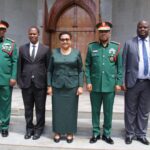Minister Hon. Damas Ndumbaro Mandates Formalisation of Culture, Arts, and Sports Sectors in Tanzania
In a significant move aimed at enhancing the operational framework of the Culture, Arts, and Sports sectors in Tanzania, Minister Hon. Damas Ndumbaro has issued a directive to Culture and Sports Officers at regional, council, and district levels. This directive, which was announced on 17 June in Tabora, requires these officers to oversee the formalisation of operations within their respective sectors.
The implementation of these directives will be subject to close monitoring, with evaluations scheduled to commence in July 2024.
A Strategic Initiative for Cultural and Sports Development
The directive from Minister Damas Ndumbaro serves to illustrate the Tanzanian government’s commitment to fostering a structured and efficient environment for cultural, artistic, and sports activities.
The formalisation of operations is intended to create a more cohesive and supportive framework that will enable these sectors to thrive. It is anticipated that this initiative will result in notable enhancements to the management and promotion of cultural heritage, artistic expression, and sports development throughout the country.
Roles and Responsibilities of Culture and Sports Officers
The formalisation process is now the responsibility of Culture and Sports Officers at various administrative levels. These officers are tasked with ensuring the effective implementation of the process. The roles of these officers will include:
Assessment and Documentation
A comprehensive evaluation of the current operations within the Culture, Arts, and Sports sectors will be conducted by officers. This will entail the documentation of existing practices, the identification of areas that require formalisation, and the development of comprehensive reports.
Stakeholder Engagement
It will be of paramount importance to engage with a number of key stakeholders, including artists, athletes, cultural practitioners, and community leaders. Officers will facilitate dialogues and workshops with the objective of gathering input and fostering collaboration.
Policy Implementation
It is the responsibility of the officers to translate the directive into actionable policies and procedures. This will entail the formulation of guidelines, the establishment of standards, and the monitoring of compliance with national regulations.
Monitoring and Evaluation
It is of the utmost importance to implement a system of continuous monitoring and evaluation in order to accurately track progress and identify any potential challenges that may arise. Officers will establish metrics and benchmarks to assess the efficacy of the formalisation efforts.
Anticipated Outcomes and Benefits
The formalisation of the Culture, Arts, and Sports sectors is anticipated to yield a number of benefits, including:
Enhanced Coordination
The implementation of a structured framework will enhance collaboration between various stakeholders, resulting in enhanced efficiency and effectiveness in the management of cultural and sporting activities.
Increased Funding and Support
The establishment of a transparent and coherent framework will facilitate the acquisition of financial and material resources from both governmental and private sources. This will facilitate the acquisition of the resources required for the development of these sectors.
Preservation of Cultural Heritage
The process of formalisation will assist in the preservation of Tanzania’s rich cultural heritage by ensuring the documentation and promotion of traditional practices and artistic expressions.
Promotion of Talent
A structured approach will facilitate the presentation of artists’ and athletes’ talents to a greater extent, both locally and internationally.
Economic Growth
The advancement of the culture, arts, and sports sectors has the potential to contribute significantly to the national economy, creating employment opportunities and generating revenue through tourism and related activities.
Implementation Timeline and Evaluation
The directive delineates a transparent schedule for implementation, with evaluations scheduled to commence in July 2024. The timeline allows sufficient time for Culture and Sports Officers to conduct the necessary assessments, engage with stakeholders, and develop and implement policies. The evaluation process will be comprehensive, with officers being assessed on their ability to meet the established benchmarks and deliver tangible results.
Conclusion
The directive issued by Minister Hon. Damas Ndumbaro represents a pivotal step towards the formalisation of the Culture, Arts, and Sports sectors in Tanzania. By empowering Culture and Sports Officers to oversee this process, the government is laying the groundwork for a more structured and supportive environment that will enable these sectors to flourish. As the implementation phase progresses, the anticipated benefits of enhanced coordination, increased funding, the preservation of cultural heritage, the promotion of talent, and economic growth are expected to become increasingly evident. The evaluations, which are scheduled to commence in July 2024, will provide valuable insights into the effectiveness of these efforts and guide future initiatives aimed at further strengthening Tanzania’s cultural and sports landscape.
Tanzania Media
- Kanyala Ferry Launch: TEMESA’s New Service for 15,000 Sengerema Residents (Mwanza) - 18 August 2025
- Russia-Tanzania Naval Cooperation: How the Smolny Training Ship Boosts Dar es Salaam’s Maritime Security - 18 August 2025
- Tanzania’s ICGLR Commitment: Stabilising the DRC & Great Lakes Region - 18 August 2025





































